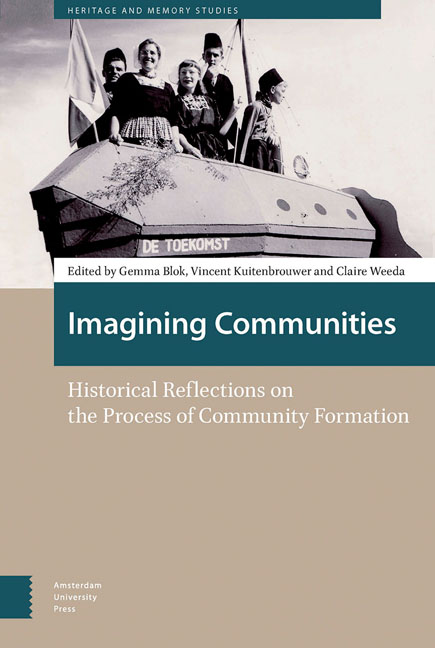Book contents
- Frontmatter
- Contents
- List of Figures
- Introduction
- 1 Meanwhile in Messianic Time: Imagining the Medieval Nation in Time and Space and English Drinking Rituals
- 2 Diverse Origins and Shared Circumstances: European Settler Identity Formation in the Seventeenth-Century Plantation Colony of Suriname
- 3 Imagining Europe: The Peace of Ryswick (1697) and the Rise of European Consciousness
- 4 Gypsy Music and the Fashioning of the National Community
- 5 ‘Tired, Worried and Overworked’: An International Imagined Community of Nervous Sufferers in Medical Advertisements, 1900-1920
- 6 ‘From Heart to Heart’: Colonial Radio and the Dutch Imagined Community in the 1920s
- 7 Indonesian Nationalism in the Netherlands, 1920s-1930s: Long-Distance Internationalism of Elite Pilgrims in Homogeneous, Empty Time
- 8 Time, Rhythm and Ritual: Imagined Communities in L’espoir (1937) and Les sept couleurs (1939)
- 9 Stamverwantschap and the Imagination of a White, Transnational Community: The 1952 Celebrations of the Jan van Riebeeck Tercentenary in the Netherlands and South Africa
- 10 ‘L’Oranie Cycliste, une grande famille’: Recycling Identities and the Pieds-Noirs Communitas, 1976-2016
- 11 Remembering and Imagining the National Past: Public Service Television Drama and the Construction of a Flemish Nation, 1953-1989
- Index
10 - ‘L’Oranie Cycliste, une grande famille’: Recycling Identities and the Pieds-Noirs Communitas, 1976-2016
Published online by Cambridge University Press: 11 December 2020
- Frontmatter
- Contents
- List of Figures
- Introduction
- 1 Meanwhile in Messianic Time: Imagining the Medieval Nation in Time and Space and English Drinking Rituals
- 2 Diverse Origins and Shared Circumstances: European Settler Identity Formation in the Seventeenth-Century Plantation Colony of Suriname
- 3 Imagining Europe: The Peace of Ryswick (1697) and the Rise of European Consciousness
- 4 Gypsy Music and the Fashioning of the National Community
- 5 ‘Tired, Worried and Overworked’: An International Imagined Community of Nervous Sufferers in Medical Advertisements, 1900-1920
- 6 ‘From Heart to Heart’: Colonial Radio and the Dutch Imagined Community in the 1920s
- 7 Indonesian Nationalism in the Netherlands, 1920s-1930s: Long-Distance Internationalism of Elite Pilgrims in Homogeneous, Empty Time
- 8 Time, Rhythm and Ritual: Imagined Communities in L’espoir (1937) and Les sept couleurs (1939)
- 9 Stamverwantschap and the Imagination of a White, Transnational Community: The 1952 Celebrations of the Jan van Riebeeck Tercentenary in the Netherlands and South Africa
- 10 ‘L’Oranie Cycliste, une grande famille’: Recycling Identities and the Pieds-Noirs Communitas, 1976-2016
- 11 Remembering and Imagining the National Past: Public Service Television Drama and the Construction of a Flemish Nation, 1953-1989
- Index
Summary
Abstract
In former French Algeria bicycle racing was an immensely popular sport amongst the Algerians and colonists (pieds-noirs) alike. When Algeria gained independence, 1962, the French left Northern Africa. Former pieds-noirs kept their memory of Algeria alive by associating with each other. This chapter explores community formation in sports (cycling) communities. For one of the last existing French Algerian sports associations, L’Amicale de l’Oranie Cycliste, the bike functions as a token of its past. How did this two-wheeled vehicle become a symbolic reference to a pays and culture that no longer exists – the province of Oranie, the city of Oran, in former western French Algeria? This case study about the bike and its representations in former colonial communities informs us about the relationship between material culture and community building.
Keywords: French Algeria, road cycling, pieds-noirs, nostalgérie, imagined community
‘Opération Retrouvailles’ was quite a militaristic name for the relaxed and convivial gathering of former French Algerians (pieds-noirs) in the small town of Frontvieille in southern France. On the morning of Sunday, 19 June 1977, a group of cyclists and their families gathered at the parking lot near ‘moulin de Daudet’. It was a special moment, because many of those present had lost sight of one another after the Independence of Algeria and their arrival in France in the summer of 1962. Fifteen years after their dramatic flight from the city of Oran dozens of cyclists mounted their bicycles and rode seven laps of seven kilometres around the famous windmill. This sports’ reunion was the birth of L’Amicale de l’Oranie Cycliste. For 40 years these bicycle fanatics organized similar ‘retrouvailles’. In the spring of 2016 the Oranais gathered for the last time.
This contribution analyses the ways in which the l’Oranie Cycliste shaped their remembrance culture and identity. Amongst the pieds-noirs memory culture (one could even speak of a memory cult) is highly developed. There is even a term for it: nostalgérie, a contraction of the words ‘nostalgie’ and ‘Algéríe’. The central question in this contribution is which place bicycle racing, and more specifically the racing bike as a material and symbolic artefact, took in the processes of remembrance, community building and identity formation. The point of departure for this exploration is Benedict Anderson's widely praised concept of imagined communities.
- Type
- Chapter
- Information
- Imagining CommunitiesHistorical Reflections on the Process of Community Formation, pp. 197 - 214Publisher: Amsterdam University PressPrint publication year: 2018



